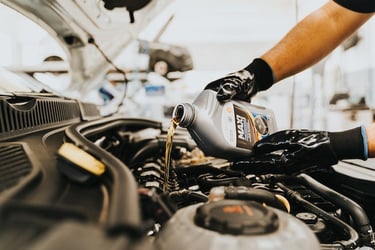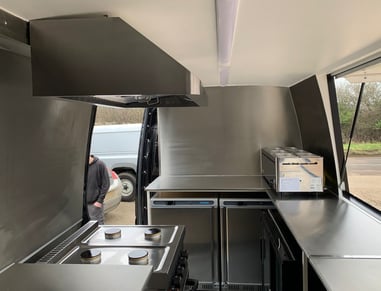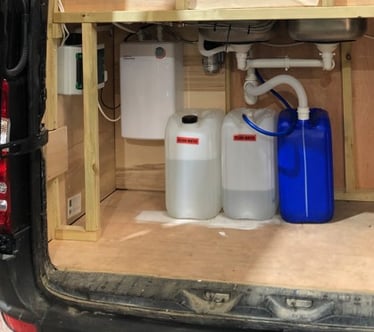If you run a food truck business you know that having any of your systems break down can be catastrophic for business.
You need your mobile kitchen fully shipshape and functional at all times in order to make a living, but that can be easier said than done.
Street food vehicles require a lot of different skills to maintain, depending on your issue you may need a mechanic, electrician or plumber to assist you.
In this guide I will explain basic food truck maintenance and repair, troubleshooting and when to seek professional help.
Why Food Truck Maintenance Matters
As a food truck owner, the regular maintenance of your vehicle is of the utmost importance. Proper maintenance ensures that your food truck is in excellent condition, which translates to improved safety, efficiency, and customer satisfaction. Neglecting maintenance can lead to unexpected breakdowns, costly repairs, and potential harm to your reputation.
Regular maintenance has several benefits, including:
- Maximizing Profits: A well-maintained food truck operates more efficiently, minimizing fuel consumption and reducing operational costs.
- Enhancing Safety: Properly maintained brakes, tires, and lighting systems contribute to a safer driving experience for you, your staff, and other road users.
- Reliability: By addressing issues before they become major problems, you can minimize downtime and ensure that your food truck is always ready to serve customers.
Essential Food Truck Maintenance Tasks
To keep your food truck in optimal condition, there are several essential maintenance tasks you should prioritize:
Regular Inspections
Perform regular inspections of your food truck to identify any potential issues. This includes checking the engine and mechanical components, tires, suspension, braking system, lighting and electrical systems, as well as the interior and food preparation area. Look for signs of wear, leaks, loose connections, or any other abnormalities.
Fluid Maintenance
Proper maintenance of fluids in your food truck is vital for optimal performance. Here are some key fluids to pay attention to:
- Engine Oil: Regularly change the oil and follow the manufacturer's recommendations for oil type and intervals.
- Coolant: Check coolant levels regularly and ensure proper mixture and cooling system efficiency.
- Brake Fluid: Inspect brake fluid levels and replace it as needed to maintain brake system effectiveness.
- Transmission Fluid: Follow manufacturer guidelines for transmission fluid changes to ensure smooth gear shifts and prolong transmission life.
- Other Fluids: Power steering fluid, windshield washer fluid, and differential fluid should also be checked and topped up as necessary.
Kitchen maintenance
Proper maintenance of your kitchen is essential to safety and your long term health. Here are the key hazards to pay attention to:
- Hygiene: Make sure you fully wipe down and sanitise all surfaces every working day.
- Ventilation: Keep your extraction unit clear of debris, grime, grease or anything else that might impede it's ability to function. Good ventilation prevents the build-up of toxic fumes that can lead to respiratory problems and grease is a major fire hazard that should be regularly removed.
- Equipment: Make sure none of your equipment, shelves or appliances are coming loose from their fixings. If anything falls or comes loose during transit you may well have an expensive repair bill on your hands.
Tire Care
Tires are a critical component of your food truck, affecting safety, fuel efficiency, and overall performance. Here's how to take care of them:
- Tire Pressure: Check tire pressure regularly using a reliable gauge and maintain them at the recommended levels.
- Tire Rotation: Rotate tires at regular intervals to promote even wear and extend their lifespan.
- Tread Depth: Monitor tire tread depth and replace tires that have worn beyond the recommended level.
- Wheel Alignment and Balancing: Regularly check the wheel alignment and have it adjusted if necessary. Balancing the wheels ensures a smooth and vibration-free ride.
.jpg?width=389&height=260&name=pexels-towfiqu-barbhuiya-8556051%20(1).jpg) Battery Health
Battery Health
A healthy battery is essential for the electrical system's functionality. Follow these maintenance tips:
- Battery Inspection: Regularly check the battery terminals for corrosion. Clean the terminals and connections using a battery terminal cleaner and a wire brush.
- Battery Charge: Test the battery's charge regularly, especially before long trips or periods of inactivity. Ensure the battery is securely mounted to prevent damage caused by vibrations.
- Battery Replacement: Replace the battery if it fails load tests or if it is more than three to five years old, depending on the manufacturer's recommendations.
Troubleshooting Common Food Truck Problems
Although regular inspections and proactive maintenance practices can go a long way, you are still likely to experience issues or faults with your food truck simply due to wear and tear over time. Follow our troubleshooting tips to get your food truck back on the road to profitability!
Engine Issues
As a food truck owner, it's important to be able to troubleshoot common engine problems. Here are a few issues you may encounter and steps to address them:
- Stalling or Rough Idling: Check for clogged air filters, fuel system issues, or faulty sensors. Clean or replace air filters, check the fuel system for blockages, and consult a professional if needed.
- Loss of Power or Decreased Performance: Inspect the intake and exhaust systems for restrictions, check for fuel delivery issues, and consider the condition of spark plugs and ignition coils.
- Unusual Noises or Vibrations: Noises or vibrations could indicate engine problems. Inspect belts, pulleys, and mounts for wear or damage. If the issue persists, consult a qualified mechanic for further diagnosis.
Cooling System Troubles
Overheating is a common issue in food trucks due to extended operating hours. Here's what to do if you encounter cooling system problems:
- Overheating: Check coolant levels, radiator hoses, and the thermostat for proper functioning. Inspect the radiator for debris or clogs. If the problem persists, consult a professional for a thorough diagnosis.
- Coolant Leaks: Inspect the cooling system for leaks. Replace faulty hoses or gaskets, and ensure all connections are secure. Use coolant leak detection kits if necessary.
Brake Maintenance
Brakes are a crucial safety component in your food truck. Regular maintenance and troubleshooting are essential. Consider the following:
- Spongy or Unresponsive Brakes: Inspect brake fluid levels and check for leaks. Bleed the brake system if necessary and replace worn brake pads or shoes.
- Unusual Noises or Vibrations: Grinding, squealing, or vibrating brakes may indicate worn brake pads, warped rotors, or other issues. Inspect the brake system thoroughly and replace any worn or damaged components.
Gas and Electrical Appliances
Proper maintenance of your cooking and refrigeration equipment is essential for food safety and operational efficiency. Here are some maintenance tips:
- Cooking Equipment: Clean cooking surfaces regularly, check for gas leaks, and inspect ignition systems for proper functioning. Follow the manufacturer's guidelines for specific equipment maintenance.
- Refrigeration Units: Regularly clean condenser coils, ensure proper airflow, and monitor temperature settings. If your refrigeration unit shows signs of malfunction, consult a professional refrigeration technician.
- Electrical Systems: Check all electrical connections and wiring for any signs of wear or damage. If you experience electrical issues such as blown fuses or faulty switches, consult an electrician or an auto electrical specialist for proper diagnosis and repair.
Plumbing issues
The plumbing system in your food truck is responsible for water supply and drainage. Here's how to troubleshoot common plumbing problems:-
Water Leaks: If you notice water leaks, start by identifying the source of the leak. Check all connections and fittings for any signs of damage or looseness. Tighten or replace connections as needed. If the issue persists, it's recommended to seek professional help from a qualified plumber to ensure a proper repair.
-
Clogged Drains: If you experience slow or blocked drainage, try using a plunger to dislodge minor clogs. For more stubborn blockages, consider using a drain snake or chemical drain cleaner. If the problem persists, it's best to consult a professional plumber to avoid further damage to your plumbing system.
When to Seek Professional Help
Whilst you may be able to fix many problems yourself, there will be times when it is best to consult a professional if you don't know what you are doing. At Raccoon we offer this service for customers experiencing conversion related faults or issues.
Complex Engine Repairs
While routine maintenance and minor repairs can often be handled by food truck owners, certain engine issues require professional assistance. Seek expert help for:
- Blown Gaskets, Timing Belt Failures, or Internal Damage: These repairs often demand specialized tools, expertise, and in-depth knowledge of the vehicle's engine system.
- Persistent and Complex Electrical Problems: An electrician or auto electrical specialist can diagnose and resolve complex electrical issues more effectively.
 Water Heater Malfunctions
Water Heater Malfunctions
If your food truck has a water heater and you encounter issues such as inadequate hot water supply, inconsistent temperatures, or leaks, it's advisable to contact a professional plumber or water heater technician.
They can assess the water heater system, identify the underlying issue, and provide appropriate repairs or replacements.
Safety-Related Concerns
Ensuring the safety of your food truck and its occupants is of utmost importance. Seek professional help for any safety-related concerns, including:
- Airbags and Seat Belts: Issues with airbags or seat belts should be addressed by professionals to ensure they function properly in the event of an accident.
- Structural Integrity: If you notice signs of damage to the food truck's structure, such as cracks, dents, or compromised integrity, consult a professional to assess and repair the damage.
What are my next steps?
Maintaining and repairing your food truck is crucial for the success of your business. By following the guidelines in this ultimate guide, you can ensure the longevity, safety, and optimal performance of your food truck.
If you find yourself unable to perform the repairs yourself, then don't hesitate to reach out to a professional.
Depending on your issue that might be a mechanic, electrician, plumber or a dedicated street food conversion service.
Want to future proof your street food business? Check out our ultimate guide to street food vehicles.
